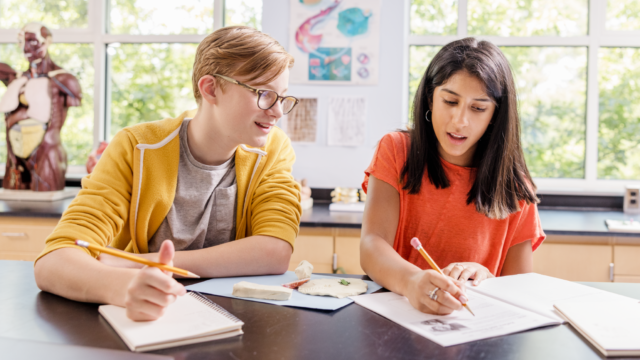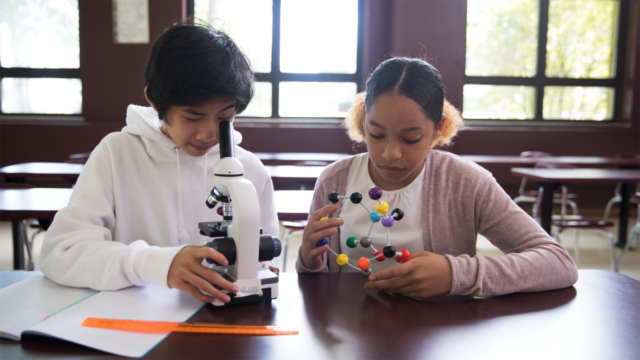
You’re in your classroom when all the sudden you hear the banging of a drum in a rhythmic beat. Do you have musicians visiting the classroom or is it a student practicing science skills at your classroom science center?
Introduce your students to the excitement of science with a physical space in the classroom dedicated to hands-on learning. Students can work and learn at their own pace, and science becomes not only practical but also fun.
What Are Science Learning Centers in the Classroom?
A science learning center, or station, is a dedicated space in your classroom to practice science concepts in real life. During a lesson, have students take turns visiting a station to take part in an activity that aligns with your lesson. With a science center, you can have students learn in small groups or independently by allowing them time during the day to explore a hands-on science activity.
This could look like a table in the back of the classroom with the necessary supplies to take part in the activity, or it could be dedicated floor space where students can work in small groups. The space can look however you decide, but make it fun with ideas like a special name or themed decorations.
Try these activities for grades K–5 from HMH Into Science to get started with your science learning center.
Science Station Ideas for the Elementary Classroom
Activity 1: Plan a Playground to Learn about the Environment (Grade K)
Learn about plants and animals with this activity. When you change your environment, it affects the living things around you. Design a playground using the activity sheet you can download below.
Set up a station at a table with crayons and paper. Students can sit and draw the different items they would include in their playground. Some examples of items might be trees, flowers, a sand box, or a swing set. Start a discussion about how people can change the environment and what impact you might have.

Activity 2: Make a Drum to Explore Sound and Energy (Grade 1)
Explore sound—energy that you can hear—with this hands-on activity. Make a drum using the activity sheet you can download below.
Set up a station with the needed materials: a metal can, a balloon, a rubber band, and wooden sticks. Have students place the balloon over the top of the can and attach it with the rubber band. Use the wooden sticks to create sound. What types of sound do your students like making?

Activity 3: Make a Model Landform to Study the Earth (Grade 2)
Learn about the different landforms on earth, like mountains, canyons, and more. Download the activity and lesson plan below for the full details.
Get your students involved by setting up a station at a table with the following materials: an aluminum pan, a spray bottle of water, gloves, sand, markers, and safety goggles. Have students prep for their work at the station by researching landforms. Before they start their hands-on work, have them discuss what they learned with their classmates. Then, use the damp sand in the aluminum pan to create landforms.

Activity 4: Learn about Force by Moving a Car (Grade 3)
Explore the effects of forces by moving a car. Download this activity and lesson plan to view the entire lesson.
Set up a station with the following materials: a toy vehicle, a tape measure, masking tape, and a stopwatch. Have students ask various questions before getting started, such as what they think will have an effect on force. Have students use different methods to move the car and discuss how force impacts the car.

Activity 5: Discover Your Senses with a Sensory Station (Grade 4)
What stimulates your senses? Experiment safely with your senses in the classroom. Download this activity and lesson plan to view the entire lesson.
Set up a station with the following materials: blindfold, paper plates, various scented items, various food items, various small objects, tape, shoebox, scissors, cardboard box, and construction paper.
Start with a pair of students. One will be blindfolded and the other will hold up scented items to test their partner’s ability to identify smells. Have students ask questions of each other: What does this smell like? Have you smelled something like this before? Set up a similar station by keeping one student blindfolded as they taste different food items. Have students describe what they taste. Finally, have students build a vison box—for the full details download the activity and lesson plan from HMH Into Science below.

Activity 6: Modeling Matter Moving Within an Ecosystem (Grade 5)
After a lesson on ecosystems and how matter moves through organisms, set up a station with the following materials: scissors, index cards, markers, paste, string, stapler, and other craft materials.
Have students research and model different types of ecosystems. Once a student chooses their ecosystem, have them fill out a data table to characterize the different organisms in the ecosystem. Students can then begin to build their food chains, connecting the parts of their ecosystem based on the relationships of each organism. Use construction paper to draw and cut out the different organisms. Then use the string to connect each piece of the chain.
For the full details, download the activity and lesson plan from HMH Into Science below.

Exploring the world of science can be an eye-opening experience in the elementary classroom. With these hands-on activities and science center ideas you can help your students find the wonder in their science lessons—and have some fun, too!
***
Find more hands-on science activities with our Grades K–5 HMH Into Science program.
Download our FREE calendar of activities!












